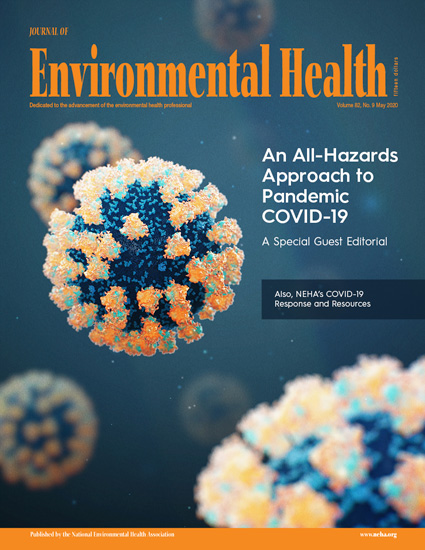Urinary volatile organic compound metabolites and COPD among US adults: mixture, interaction and mediation analysis
IF 5.3
2区 环境科学与生态学
Q1 ENVIRONMENTAL SCIENCES
引用次数: 0
Abstract
Volatile organic compounds (VOCs) encompass hundreds of high production volume chemicals and have been reported to be associated with adverse respiratory outcomes such as chronic obstructive pulmonary disease (COPD). However, research on the combined toxic effects of exposure to various VOCs on COPD is lacking. We aimed to assess the effect of VOC metabolite mixture on COPD risk in a large population sample. We assessed the effect of VOC metabolite mixture on COPD risk in 5997 adults from the National Health and Nutrition Examination Survey (NHANES) from 2011 to 2020 (pre-pandemic) using multivariate logistic regression, Bayesian weighted quantile sum regression (BWQS), quantile-based g-Computation method (Qgcomp), and Bayesian kernel machine regression (BKMR). We explored whether these associations were mediated by white blood cell (WBC) count and total bilirubin. In the logistic regression model, we observed a significantly increased risk of COPD associated with 9 VOC metabolites. Conversely, N-acetyl-S-(benzyl)-L-cysteine (BMA) and N-acetyl-S-(n-propyl)-L-cysteine (BPMA) showed insignificant negative correlations with COPD risk. The overall mixture exposure demonstrated a significant positive relationship with COPD in both the BWQS model (adjusted odds ratio (OR) = 1.30, 95% confidence interval (CI): 1.06, 1.58) and BKMR model, and with marginal significance in the Qgcomp model (adjusted OR = 1.22, 95% CI: 0.98, 1.52). All three models indicated a significant effect of the VOC metabolite mixture on COPD in non-current smokers. WBC count mediated 7.1% of the VOC mixture associated-COPD in non-current smokers. Our findings provide novel evidence suggesting that VOCs may have adverse associations with COPD in the general population, with N, N- Dimethylformamide and 1,3-Butadiene contributing most. These findings underscore the significance of understanding the potential health risks associated with VOC mixture and emphasize the need for targeted interventions to mitigate the adverse effects on COPD risk.美国成年人尿中挥发性有机化合物代谢物与慢性阻塞性肺病:混合物、相互作用和中介分析
挥发性有机化合物(VOC)包括数百种高产量化学品,据报道,它们与慢性阻塞性肺病(COPD)等不良呼吸系统疾病相关。然而,有关接触各种挥发性有机化合物对慢性阻塞性肺病的综合毒性影响的研究还很缺乏。我们的目的是在大样本人群中评估挥发性有机化合物代谢物混合物对慢性阻塞性肺病风险的影响。我们使用多元逻辑回归、贝叶斯加权量子和回归(BWQS)、基于量子的 g-Computation 方法(Qgcomp)和贝叶斯核机回归(BKMR)评估了 2011 年至 2020 年(大流行前)美国国家健康与营养调查(NHANES)中 5997 名成人的挥发性有机化合物代谢物混合物对慢性阻塞性肺病风险的影响。我们探讨了这些关联是否由白细胞(WBC)计数和总胆红素介导。在逻辑回归模型中,我们观察到 9 种挥发性有机化合物代谢物导致慢性阻塞性肺病的风险显著增加。相反,N-乙酰-S-(苄基)-L-半胱氨酸(BMA)和 N-乙酰-S-(正丙基)-L-半胱氨酸(BPMA)与慢性阻塞性肺病的风险呈不明显的负相关。在 BWQS 模型(调整后的比值比 (OR) = 1.30,95% 置信区间 (CI):1.06, 1.58)和 BKMR 模型中,总体混合物暴露与慢性阻塞性肺病呈显著正相关,而在 Qgcomp 模型(调整后的比值比 (OR) = 1.22,95% 置信区间 (CI):0.98, 1.52)中则呈边缘显著性。所有三个模型都表明,在非经常吸烟者中,挥发性有机化合物代谢物混合物对慢性阻塞性肺病有明显影响。在非经常吸烟者中,白细胞计数介导了 7.1% 的挥发性有机化合物混合物相关慢性阻塞性肺病。我们的研究结果提供了新的证据,表明挥发性有机化合物可能与普通人群中的慢性阻塞性肺病有不良关联,其中以 N,N- 二甲基甲酰胺和 1,3- 丁二烯的影响最大。这些发现强调了了解与挥发性有机化合物混合物相关的潜在健康风险的重要性,并强调有必要采取有针对性的干预措施,以减轻对慢性阻塞性肺病风险的不利影响。
本文章由计算机程序翻译,如有差异,请以英文原文为准。
求助全文
约1分钟内获得全文
求助全文
来源期刊

Environmental Health
环境科学-公共卫生、环境卫生与职业卫生
CiteScore
10.10
自引率
1.70%
发文量
115
审稿时长
3.0 months
期刊介绍:
Environmental Health publishes manuscripts on all aspects of environmental and occupational medicine and related studies in toxicology and epidemiology.
Environmental Health is aimed at scientists and practitioners in all areas of environmental science where human health and well-being are involved, either directly or indirectly. Environmental Health is a public health journal serving the public health community and scientists working on matters of public health interest and importance pertaining to the environment.
 求助内容:
求助内容: 应助结果提醒方式:
应助结果提醒方式:


